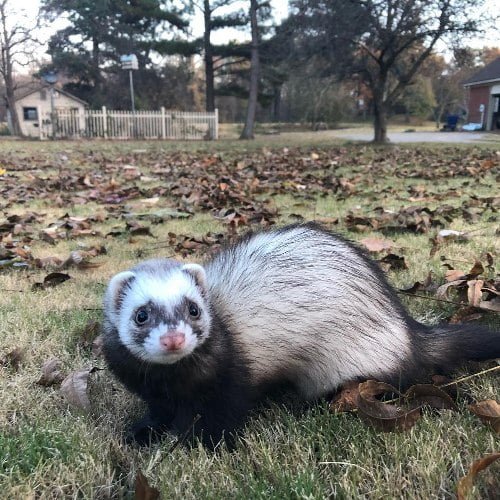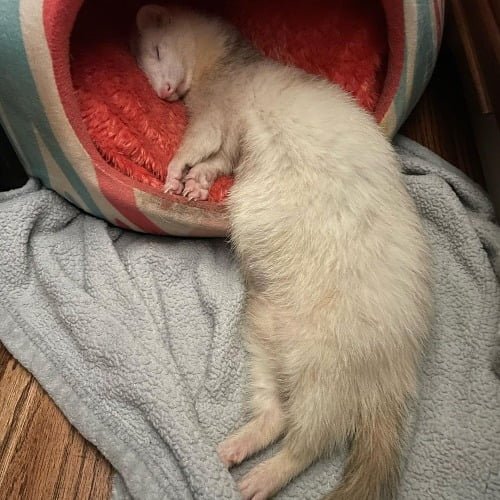Ferrets are bright and sociable pets that enjoy playing. They are weasel-like animals that belong to the Mustelidae family, which also includes badgers, pine martens, and otters. Although domesticated and wild ferrets have many distinctions, their typical growth pattern is one similarity.
Ferrets are small, cute creatures that many people think would make great pets. Though they may be small, they still have a lot of growing to do and can be quite engaging and entertaining. But before you go out and buy one, it’s important to know how big they get and what factors affect their growth.
In this blog post, we’ll discuss the size of ferrets as well as some other things you should know about them before bringing one home. So read on for more information!
Size and Growth Chart for Male Ferrets

The average ferret will grow to be about 18 inches long and weigh 2-5 pounds. Male ferrets tend to be larger than females and can reach lengths of up to 20 inches and weights of up to 5 pounds. However, there is some variation in size among ferrets, so some may be larger or smaller than this.
The following is a growth chart for male ferrets:
| Age | Weight (in pounds) | Length (in inches) |
| 2 weeks | 0.25-0.75 | 4-8 |
| 4 weeks | 0.75-1.25 | 8-12 |
| 5-8 weeks | 1.25-2 | 12-16 |
| 4 months | 2-3 | 16-20 |
| 5-8 months | 3-5 | 20-24 |
Size and Growth Chart for Female Ferrets

Female ferrets are likely to be smaller than males and typically grow to be 16-18 inches long and 2-4 pounds in weight. They will reach their full adult size by about 10 months of age.
Given below is the average growth chart for female ferrets:
| Age | Weight (in pounds) | Length (in inches) |
| 2 weeks | 0.25-0.6 | 4-6 |
| 4 weeks | 0.6-1 | 7-10 |
| 5-8 weeks | 1-2 | 10-14 |
| 4 months | 2-3 | 14-16 |
| 5-8 months | 3-4 | 16-18 |
When Does a Ferret Stop Growing?
Ferrets reach their full adult size by around 6-10 months of age. When an adult ferret reaches the size and weight where it can perform all of its natural behaviors, this is when they are considered full-grown. Ferrets are considerably slower to mature when it comes to demonstrating maturity.
However, they may continue to fill out and add some muscle mass until they are about 1-2 years old.
Factors Affecting Ferret Size
Several factors can influence a ferret’s size, including its diet, health, neutering, and genetics. It’s important to keep these things in mind when considering a ferret as a pet. We will discuss each of these factors in more detail below.
Diet: A good diet is essential for ferrets to reach their full-size potential. A diet that is high in protein and fat will help them to grow and stay healthy. A diet that is too low in calories can stunt their growth.
Fruits and vegetables are inappropriate for ferrets as their digestive system cannot process these items properly. This can lead to health problems such as intestinal blockages.
Health: Health problems can lead to stunted growth in ferrets. Ferrets are susceptible to several health problems, some of which can be deadly. It’s important to take your ferret to the vet for regular check-ups and to get them vaccinated against common diseases.
Neutering: Get your ferrets spayed or neutered if you do not want them to reproduce. This is a crucial time in their lives, so be prepared. Female ferrets can die from being in heat for an extended period; the only way to remove them from this state is by going to a veterinarian or breeding. Male ferrets can become aggressive if they are not neutered.
Genetics: Genetics play a role in a ferret’s size. Some ferrets are just naturally bigger than others. This is something you cannot change. However, you can help your ferret to reach its full-size potential by providing it with a good diet and proper care.
How to Recognize an Overweight Ferret
Ferrets come in a variety of shapes and sizes, but if your ferret is noticeably overweight, there are a few signs and symptoms you can look for.
Potbelly:
An overweight ferret will typically have a pot belly, and its chest and sides may appear bulging.
Difficulty moving:
If your ferret is carrying around extra weight, they may have difficulty running and climbing like they used to. You may notice them getting tired more easily and taking more naps than before.
Lethargy:
In general, an overweight ferret will seem lazier and less active than a healthy ferret. They may not want to play as much as they used to, and may even sleep more than normal.
Excess Skin:
Another sign of an overweight ferret is excess skin, especially around the neck and shoulders. This excess skin can make it difficult for your ferret to move their head and neck and may cause them to trip and fall more easily.
What Problems Can Overweight Ferrets Face?

Carrying around extra weight can put a lot of strain on your ferret’s body and can lead to a variety of health problems, such as:
Diabetes:
Extra weight can lead to insulin resistance, which is a precursor to diabetes.
Heart Disease:
Being overweight puts your ferret at risk for heart disease and high blood pressure.
Liver Disease:
Fatty liver disease is a common problem in overweight ferrets.
Arthritis:
Excess weight can put pressure on your ferret’s joints and lead to arthritis.
Breathing problems:
Overweight ferrets are more likely to have respiratory problems.
In addition to the health problems listed above, overweight ferrets are also more likely to suffer from heatstroke and be less active overall.
How to Help an Overweight Ferret Lose Weight
If your ferret is overweight, there are a few things you can do to help them lose weight.
Cut food intake:
You’ll need to cut down on the amount of food you’re giving your ferret. A good rule of thumb is to feed them no more than 1 teaspoon of food per pound of body weight per day.
Increase exercise:
Encourage your ferret to get more exercise by providing them with toys and playtime. A good way to do this is to set up a Ferret Play Gym.
Offer healthy food options:
Make sure you’re offering your ferret healthy food options. This includes fresh fruits and vegetables, lean protein, and whole-grain foods.
Monitor weight loss:
Monitor your ferret’s weight loss progress by weighing them regularly. You should see a slow and steady weight loss of no more than 1/2 pound per month.
With some effort and patience, you can help your ferret lose weight and get back to a healthy weight.
The Bottom Line
The average lifespan of a ferret is 5-10 years. However, some ferrets have been known to live up to 15 years with proper care. The key to a long and healthy life for your ferret is to provide them with good food, clean water, a spacious home, and plenty of love and attention.
Ferrets are wonderful pets for those who are willing to commit to their care. They are playful, curious, and full of personality. However, they are not the right pet for everyone. Before you adopt a ferret, be sure to do your research and make sure that you are prepared to provide them with the care they need.
In general, maintaining a well-rounded diet for your ferrets and neutering them at approximately 3 months old will enable them to live happily and healthily for many years.
We hope you have enjoyed reading this article and that you have learned something new about ferrets. If you have any questions or comments, please leave them below.
Thank you for reading!
FAQs
How big can the ferret’s tail grow?
Ferrets have long, lithe bodies, and their tails make up almost one-third of their body length. It can grow up to 6 inches.
How much sleep do ferrets need for a healthy weight?
A healthy ferret should sleep between 10-12 hours a day. If your ferret is not getting enough sleep, it may start to lose weight and become unhealthy.
What are some common health problems for ferrets?
Common health problems for ferrets include dental disease, ear mites, and respiratory infections. Ferrets are also susceptible to heat stroke and hypothermia, so it is important to provide them with a warm, safe environment.
How often should I take my ferret to the vet?
Ferrets should see a vet at least once after 2 weeks for a wellness checkup. If your ferret is sick or injured, you should take it to the vet as soon as possible.
What do ferrets eat for an healthy growth?
Ferrets are obligate carnivores, which means that their bodies are designed to digest and use only animal-based proteins. A healthy diet for a ferret should be high in protein and low in carbohydrates.





